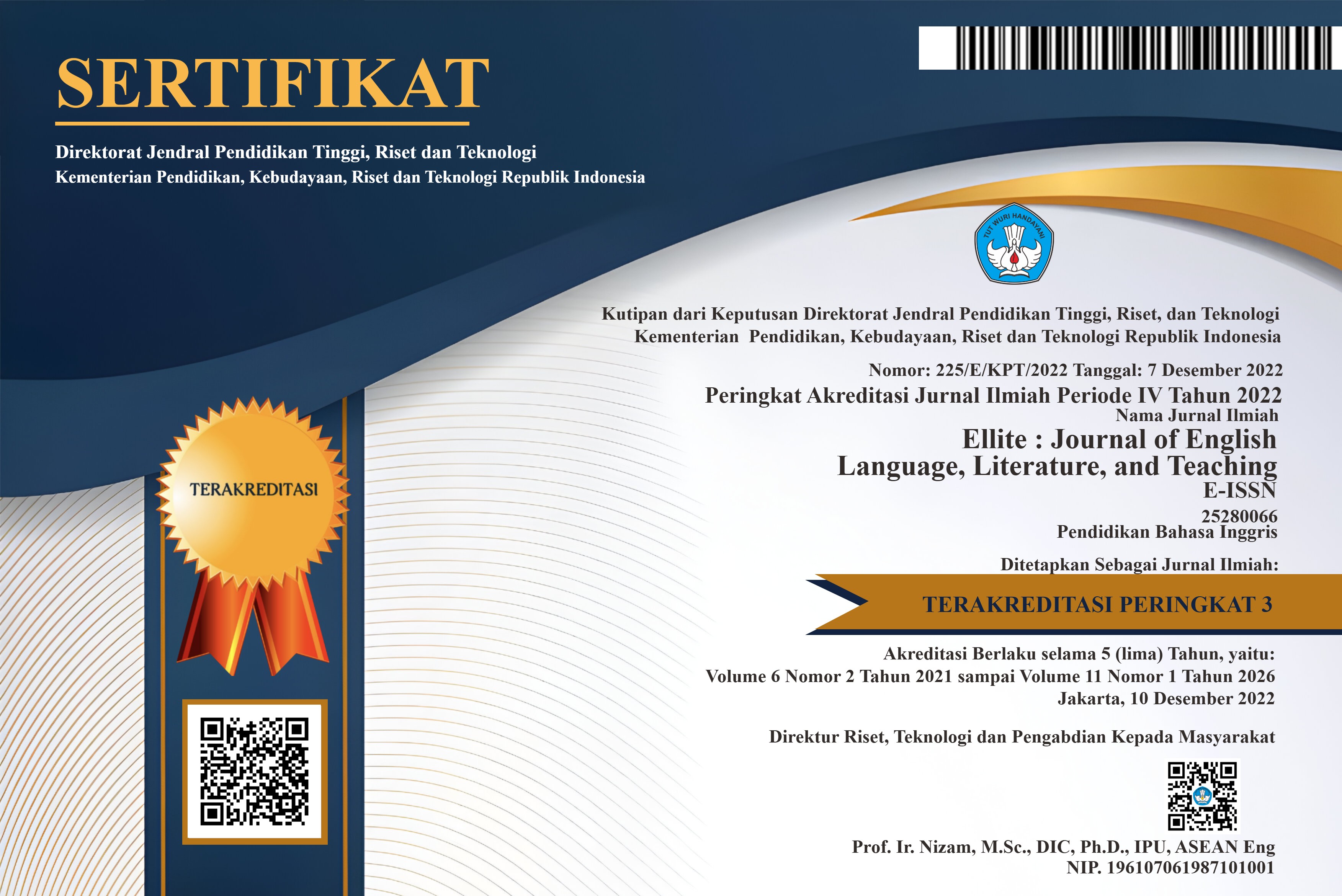An Explanatory Study: Exploring EFL Students’ Attitudes Toward the Use of AI Tools in Academic Writing
DOI:
https://doi.org/10.32528/ellite.v10i1.3389Keywords:
AI, Academic Writing, EFL Students, Students’ Attitudes, Explanatory StudyAbstract
The purpose of this study was to investigate EFL learners' attitudes on the use of AI-powered tools in academic writing with the challenges. Combining quantitative and qualitative research, this mixed-methods study followed an explanatory study design. The researcher gathered the data through questionnaires and semi-structured interviews. Using SPSS through descriptive statistics analysis preceded by validity and reliability tests of the research instrument, researchers analyzed quantitative data. The thematic analysis helped the researcher to examine qualitative data. Triangulation was also done to validate the findings from the qualitative and quantitative data. The results of this study showed that EFL students had a positive attitude toward the application of artificial intelligence in academic writing, including encompassing structuring ideas, enhancing sentence structure, and raising self-confidence. However, the overuse of artificial intelligence shows signs of caution, such as a decline in its inventiveness and critical thinking. Besides, using artificial intelligence in academic writing presents some challenges for learners. These challenges include the quality of arguments and the validity of references presented by the AI as well as the detection of AI generated.
References
Alhajji, R. A. Y. (2024). Assessing the influence of AI on modern student writing standards: An educators’ perspective. Research Journal in Advanced Humanities, 5(3), 375–388. https://doi.org/10.58256/5tpepv73
Alzahrani, A. S., Tsai, Y.-S., Aljohani, N., Whitelock-wainwright, E., & Gasevic, D. (2023). Do teaching staff trust stakeholders and tools in learning analytics? A mixed methods study. Educational Technology Research and Development, 71(4), 1471–1501. https://doi.org/10.1007/s11423-023-10229-w
Ambarita, N., & Nurrahmatullah, M. F. (2024). Impacts of Artificial Intelligence on Student Learning: A Systematic Literature Review. Jurnal VARIDIKA, 36(1), 13–30. https://doi.org/10.23917/varidika.v36i1.4730
An, A. N., Tamami, F. Q. A., Daud, Z., Salleh, N. M., Ishak, M. H. bin, & Muthoifin, M. (2025). Understanding the Integration of Deep Learning and Artificial Intelligence in Quranic Education and Research through Bibliometric Analysis. Educational Process: International Journal, 14. https://doi.org/10.22521/edupij.2025.14.12
Anani, G. E., Nyamekye, E., & Bafour-Koduah, D. (2025). Using artificial intelligence for academic writing in higher education: the perspectives of university students in Ghana. Discover Education, 4(1). https://doi.org/10.1007/s44217-025-00434-5
Arifani, Y., Hidayat, N., Mulyadi, D., & Wardhono, A. (2020). Enhancing Eap Learners’ Vocabulary Acquisition: an Investigation of Individual Sms-Based Reporting Activities. Teaching English with Technology, 20(5), 125–146. http://repository.unimus.ac.id/6073/1/ARTICLE7 %282%29.pdf
Asgari, M., Mannila, L., Tsai, F.-C., & Strömbäck, F. (2025). Humans or Machines for Teaching: Trust and Preferences among University Students. Proceedings of the 2024 the 16th International Conference on Education Technology and Computers, ICETC 2024, 17–25. https://doi.org/10.1145/3702163.3702166
Baturay, M. H., Gökçearslan, Ş., & Ke, F. (2017). The relationship among pre-service teachers’ computer competence, attitude towards computer-assisted education, and intention of technology acceptance. International Journal of Technology Enhanced Learning, 9(1), 1–13. https://doi.org/10.1504/IJTEL.2017.084084
Bilikozen, N. (2024). Nurturing Responsible AI Practices in L2 Writing: Empowering Student Voices. English Scholarship Beyond Borders, 10(2), 151–185. https://www.scopus.com/inward/record.uri?eid=2-s2.0-85204406110&partnerID=40&md5=66b39cea9e7b1efef29b0d9ce340ae9d
Chang, J.-L., Hung, H.-T., & Yang, Y.-T. C. (2024). Effects of an annotation-supported Socratic questioning approach on students’ argumentative writing performance and critical thinking skills in flipped language classrooms. Journal of Computer Assisted Learning, 40(1), 37–48. https://doi.org/10.1111/jcal.12856
Dave, A. M., & Russell, D. R. (2010). Drafting and revision using word processing by undergraduate student writers: Changing conceptions and practices. Research in the Teaching of English, 44(4), 406–434. https://doi.org/10.58680/rte201010849
Devanti, Y. M., & Harfal, Z. (2024). Transformative Practices: Integrating Automated Writing Evaluation in Higher Education Writing Classrooms - A Systematic Review 423 Indonesian Journal on Learning and Advanced Education. Indonesian Journal on Learning and Advanced Education, 6(3), 423–441. https://doi.org/10.23917/ijolae.v6i3.23675
Du, H. (2022). Research on the Application of Blackboard Writing Images in College English Writing Teaching Aided by “pOA” Theory. Mathematical Problems in Engineering, 2022. https://doi.org/10.1155/2022/6829622
Fakhar, H., Lamrabet, M., Echantoufi, N., El Khattabi, K., & Ajana, L. (2024). Artificial Intelligence from Teachers’ Perspectives and Understanding: Moroccan Study. International Journal of Information and Education Technology, 14(6), 856–864. https://doi.org/10.18178/ijiet.2024.14.6.2111
Fernández-Cárdenas, J. M., & Piña-Gómez, L. (2014). El Oficio Del Escritor Académico :Un portal para promover el uso de la lengua escrita como práctica social. Revista Mexicana de Investigacion Educativa, 19(60), 187–212. https://www.scopus.com/inward/record.uri?eid=2-s2.0-84897710172&partnerID=40&md5=09fb142ac015a689be49ff058de7bded
Gao, R., Yu, D., Gao, B., Hua, H., Hui, Z., Gao, J., & Yin, C. (2025). Legal regulation of AI-assisted academic writing: challenges, frameworks, and pathways. Frontiers in Artificial Intelligence, 8. https://doi.org/10.3389/frai.2025.1546064
Gong, K., & Pang, H. (2024). Relationships Between Chinese First-Year University EAP Learners’ Self-Regulated Learning Strategy Use and Beliefs About Academic Writing: A Structural Equation Model. The Asia-Pacific Education Researcher. https://doi.org/10.1007/s40299-024-00870-1
Hackman, S. T., & Reindl, S. (2022). Challenging EdTech: Towards a More Inclusive, Accessible and Purposeful Version of EdTech. Knowledge Cultures, 10(1), 7–21. https://doi.org/10.22381/kc10120221
He, Y. (2024). The Metaphor of AI in Writing in English: A Reflection on EFL Learners’ Motivation to Write, Enjoyment of Writing, Academic Buoyancy, and Academic Success in Writing. International Review of Research in Open and Distributed Learning, 25(3), 271–286. https://doi.org/10.19173/irrodl.v25i3.7769
Hegazy, A. Z., Gaber, S. A., Alkhateeb, I. A., Alqatam, M. A., Almughyirah, S. M., Mahgoub, Y. M., & Shahat, H. A. (2024). Saudi Postgraduate Students` Ethical Commitment between Awareness and Application of Artificial Intelligence in Scientific Writing. International Journal of Learning, Teaching and Educational Research, 23(10), 583–598. https://doi.org/10.26803/ijlter.23.10.28
Hidayat, N., Afdholy, N., & Arifani, Y. (2023). The effectiveness and challenges of online teaching of EFL teachers in the COVID-19 crisis. The International Journal of Humanities Education, 22(1), 95–114. https://doi.org/10.18848/2327-0063/CGP/v22i01/95-114
Hidayat, N., Setiawan, S., & Anam, S. (2024). Publishing a research paper in reputable journals: doctoral students’ perspectives. International Journal of Evaluation and Research in Education , 13(2), 1227–1234. https://doi.org/10.11591/ijere.v13i2.25701
Joseph, G. V, Athira, P., Anit Thomas, M., Jose, D., Roy, T. V, & Prasad, M. (2024). Impact of Digital Literacy, Use of AI tools and Peer Collaboration on AI Assisted Learning: Perceptions of the University students. Digital Education Review, 45, 43–49. https://doi.org/10.1344/der.2024.45.43-49
Kumar, S. (2024). The Effects of Information and Communication Technology (ICT) on Pedagogy and Student Learning Outcome in Higher Education. EAI Endorsed Transactions on Scalable Information Systems, 11(2), 1–5. https://doi.org/10.4108/eetsis.4629
Lee, A. S.-J., & Ho, W. Y. J. (2021). Case Study 5, Macao: Using Google Docs for Peer Review. In Language Learning with Technology: Perspectives from Asia (pp. 123–132). https://doi.org/10.1007/978-981-16-2697-5_10
Lijie, H., Mat Yusoff, S., & Mohamad Marzaini, A. F. (2025). Influence of AI-driven educational tools on critical thinking dispositions among university students in Malaysia: a study of key factors and correlations. Education and Information Technologies, 30(6), 8029–8053. https://doi.org/10.1007/s10639-024-13150-8
Lim, E. M. (2023). The effects of pre-service early childhood teachers’ digital literacy and self-efficacy on their perception of AI education for young children. Education and Information Technologies, 28(10), 12969–12995. https://doi.org/10.1007/s10639-023-11724-6
Londoño Vásquez, D. A., & Ramírez Botero, A. (2017). Academic writing institutionalization: From code acquisition to publication. Revista de Letras, 57(2), 141–158. https://www.scopus.com/inward/record.uri?eid=2-s2.0-85067956622&partnerID=40&md5=9a4f29c281eb9b11305e8f6fdd2f5913
Malik, A. R., Pratiwi, Y., Andajani, K., Numertayasa, I. W., Suharti, S., Darwis, A., & Marzuki. (2023). Exploring Artificial Intelligence in Academic Essay: Higher Education Student’s Perspective. International Journal of Educational Research Open, 5(September), 100296. https://doi.org/10.1016/j.ijedro.2023.100296
Mohammad, T., Alzubi, A. A. F., Nazim, M., & Khan, S. I. (2024). Paraphrasing Prowess: Unveiling the Insights of EFL Students and Teachers on QuillBot Mastery. International Journal of Information and Education Technology, 14(5), 642–650. https://doi.org/10.18178/ijiet.2024.14.5.2088
Naeem, M., Ozuem, W., Howell, K., & Ranfagni, S. (2023). A Step-by-Step Process of Thematic Analysis to Develop a Conceptual Model in Qualitative Research. International Journal of Qualitative Methods, 22, 16094069231205788. https://doi.org/10.1177/16094069231205789
Nguyen, A., Hong, Y., Dang, B., & Huang, X. (2024). Human-AI collaboration patterns in AI-assisted academic writing. Studies in Higher Education, 49(5), 847–864. https://doi.org/10.1080/03075079.2024.2323593
Rafida, T., Suwandi, S., & Ananda, R. (2024). EFL Students’ Perception In Indonesia And Taiwan On Using Artificial Intelligence To Enhance Writing Skills. Jurnal Ilmiah Peuradeun, 12(3), 987–1016. https://doi.org/10.26811/peuradeun.v12i3.1520
Rashtchi, M., & Porkar, R. (2020). Brainstorming Revisited: Does Technology Facilitate Argumentative Essay Writing? Language Teaching Research Quarterly, 18, 1–20. https://doi.org/10.32038/ltrq.2020.18.01
Ravikumar, T., Raghunandan, G., John Benedict, D., Seshadri, V., & Abhinandan, N. (2024). Relationship between Digital Learning, Digital Literacy and Academic Performance of Higher Education Students: Moderated Mediation Role of Critical Thinking. International Research Journal of Multidisciplinary Scope, 5(3), 39–50. https://doi.org/10.47857/irjms.2024.v05i03.01054
Rezaei, M., Salehi, H., & Tabatabaei, O. (2024). Uses and Misuses of ChatGPT as an AI-Language Model in Academic Writing. 2024 10th International Conference on Artificial Intelligence and Robotics, QICAR 2024, 256–260. https://doi.org/10.1109/QICAR61538.2024.10496607
Riwayatiningsih, R., Yuliasri, I., Rukmini, D., & Pratama, H. (2025). The Differential Impact of Specific Metacognitive Strategies on EFL Academic Writing Performance. Forum for Linguistic Studies, 7(1), 219–231. https://doi.org/10.30564/fls.v7i1.7986
Salvatori, R. (2019). Advanced technologies for social communication: Methods and techniques in online learning. In Studies in Systems, Decision and Control (Vol. 104, pp. 333–342). https://doi.org/10.1007/978-3-319-54819-7_22
Sarwanti, S., Sariasih, Y., Rahmatika, L., Islam, M. M., & Riantina, E. M. (2024). Are They Literate on ChatGPT? University Language Students’ Awareness, Benefits and Challenges in Higher Education Learning. Online Learning, 28(3), 105–130. https://doi.org/10.24059/olj.v28i3.4599
Scott-Herring, M. (2024). Artificial intelligence in academic writing: a detailed examination. International Journal of Nursing Education Scholarship , 21(1). https://doi.org/10.1515/ijnes-2024-0050
Shata, A., & Hartley, K. (2025). Artificial intelligence and communication technologies in academia: faculty perceptions and the adoption of generative AI. International Journal of Educational Technology in Higher Education, 22(1). https://doi.org/10.1186/s41239-025-00511-7
Singh, H., Singh, V. V, Gupta, A. K., & Kapur, P. K. (2024). Assessing e-learning platforms in higher education with reference to student satisfaction: a PLS-SEM approach. International Journal of System Assurance Engineering and Management, 15(10), 4885–4896. https://doi.org/10.1007/s13198-024-02497-3
Singh, M. K. M. (2019). Academic reading and writing challenges among international EFL master’s students in a Malaysian university: The voice of lecturers. Journal of International Students, 9(4), 972–992. https://doi.org/10.32674/jis.v9i3.934
Soozandehfar, S. M. A. (2020). Accounting for change in critical thinking components mediated by differential effects of paper-based vs. Web-assisted feedback in writing. Applied Research on English Language, 9(3), 365–381. https://doi.org/10.22108/are.2019.117949.1472
Triwayatno, N., Irawan, N., Ghofur, A., & Pramujiono, A. (2025). Enhancing Students’ English Essay Writing Proficiency Ai-Based Automatic Feedback Systems. Jurnal Penelitian Humaniora, 26(1), 36–48. https://doi.org/10.23917/jph.v26i1.9041
Usher, M., & Amzalag, M. (2025). From Prompt to Polished: Exploring Student–Chatbot Interactions for Academic Writing Assistance. Education Sciences, 15(3). https://doi.org/10.3390/educsci15030329
Wang, Q., & Newell, G. E. (2025). Teaching and learning argumentative writing as critical thinking in an EFL composition classroom. Learning, Culture and Social Interaction, 51. https://doi.org/10.1016/j.lcsi.2025.100891
Wei, Y., Sulaiman, N. A., & Ismail, H. H. (2024). Academic English Writing Challenges in a Blended EFL and ESL Learning Environment: Insights from Chinese International High School Students. International Journal of Learning, Teaching and Educational Research, 23(2), 275–293. https://doi.org/10.26803/ijlter.23.2.13
Wu, Y., & Schunn, C. D. (2021). The Effects of Providing and Receiving Peer Feedback on Writing Performance and Learning of Secondary School Students. American Educational Research Journal, 58(3), 492–526. https://doi.org/10.3102/0002831220945266
Xu, T., & Jumaat, N. F. (2024). ChatGPT-Empowered Writing Strategies in EFL Students’ Academic Writing: Calibre, Challenges and Chances. International Journal of Interactive Mobile Technologies , 18(15), 95–114. https://doi.org/10.3991/ijim.v18i15.49219
Yang, M. (2023). Supervisory feedback, reflection, and academic discourse socialization: Insights from an L2 doctoral student’s paper writing experience. Journal of English for Academic Purposes. https://doi.org/10.1016/j.jeap.2023.101215
Zhu, H. (2023). Language as power: Translanguaging’s interaction with Chinese international students’ English academic writing processes outside the classroom. L2 Journal, 15(1), 1–7. https://doi.org/10.5070/L215160984
Downloads
Published
Issue
Section
Categories
License
Copyright (c) 2025 Nur Hidayat

This work is licensed under a Creative Commons Attribution 4.0 International License.







